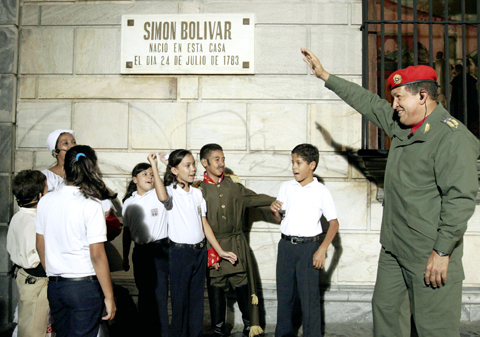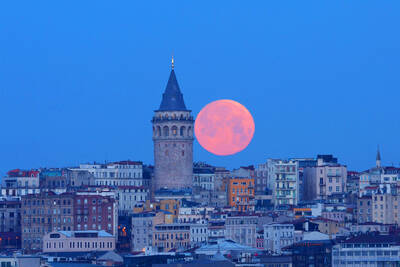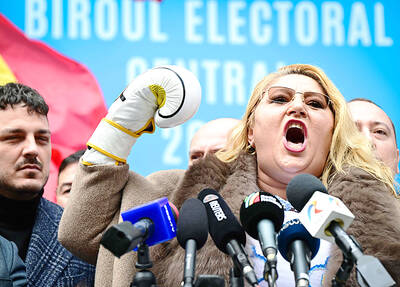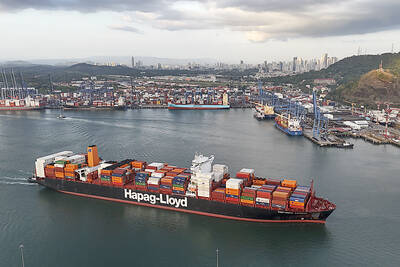Venezuelan President Hugo Chavez began a national party on Sunday for the 200th anniversary of Venezuela’s independence, but critics used the date to accuse him of turning the nation into a Cuban-style dictatorship.
The socialist leader — who casts himself as the heir to 19th century South American independence hero Simon Bolivar — was welcoming fellow left-wing heads of state, such as Cuba’s Raul Castro and Bolivia’s Evo Morales, through the day.
Yesterday, exactly 200 years after Venezuela’s initial declaration of independence from Spain, the leaders of the Chavez-led ALBA alliance of Latin American countries where to hold a summit in Caracas amid celebrations across the nation.

PHOTO: REUTERS
“Happy commemoration of 200 years of struggle,” Chavez wrote in a message to the nation. “Fatherland, Socialism or Death. We will overcome.”
As well as echoing the language of his mentor Fidel Castro, the former Cuban president, Chavez has likewise presented his rule as a chance to bury the influence of capitalism.
“We’re still not fully independent, but now we’ll finish the job,” he told a group of children, some dressed as Bolivar. “A patriot has to be like Bolivar, revolutionary and socialist.”
The Venezuelan president, who came to prominence in a failed 1992 coup then won power at the ballot box six years later, has taken over Fidel Castro’s role as the continent’s leading critic of US power.
Street parties and special events took place all over Venezuela on Sunday. Armies of workers and volunteers — dressed in the red T-shirts and caps of Chavez supporters — swarmed over Caracas, sprucing up streets and buildings ahead of a military parade and other events planned for yesterday.
Raul Castro said he was “overjoyed” to be in Venezuela, adding the 49th anniversary of the failed US-backed Bay of Pigs invasion of Cuba was another cause to celebrate.
“In the future, we will celebrate the 490th anniversary,” he said.
Chavez opponents, who have only beaten him once in about a dozen votes since 1998, fumed as they saw him turn the bicentennial into a huge show of support for his government.
Some supporters of the First Justice Party rallied at a Caracas square for an alternative “independence declaration.”
“After 200 years, we are again under an odious foreign domination,” its leader Julio Borges said, accusing Chavez of an “indignant submission” to the Castro brothers.
“The freedom fighters 200 years ago did not fight for ... dictatorship,” he said.
Thousands of Cubans work with the Chavez government, in shanty-town medical clinics and sports training centers, plus politically delicate areas such as the security agencies. Chavez supporters view that as a model of international cooperation, while critics say it breaches sovereignty.
Former Venezuelan president Carlos Andres Perez, whom Chavez failed to oust in 1992, also weighed in.
“It is not possible to celebrate when a militarized, authoritarian and pro-communist regime, headed by a murderous coup-monger, has kidnapped the nation,” Perez said.
Venezuelan politicians are gearing up for a September assembly vote, where opposition parties hope to cut into the government’s majority and show Chavez’s popularity is waning.
Though opinion polls are difficult to follow in Venezuela, because of accusations of political bias, it is clear Chavez’s popularity has fallen in the last year, from more than 60 percent to about 50 percent or less.
That, however, is still a relatively high rating and enough to help him win in September, analysts say.
Venezuela’s poor majority give Chavez high marks for social policies, including free clinics and schools, and subsidized food networks.
“This idea that Chavez is losing approval and is on the way out is absolute rubbish,” said pensioner Edith Valencia, eating at a state-run “socialist pancake” shop in Caracas. “We admit not everything is perfect and it is a tough year, we even admit he has made some mistakes, but will we vote for him? You bet. I am a Chavista to the core.”
Russian Prime Minister Vladimir Putin and Belarussian President Alexander Lukashenko sent congratulations for the 200th anniversary.

RARE EVENT: While some cultures have a negative view of eclipses, others see them as a chance to show how people can work together, a scientist said Stargazers across a swathe of the world marveled at a dramatic red “Blood Moon” during a rare total lunar eclipse in the early hours of yesterday morning. The celestial spectacle was visible in the Americas and Pacific and Atlantic oceans, as well as in the westernmost parts of Europe and Africa. The phenomenon happens when the sun, Earth and moon line up, causing our planet to cast a giant shadow across its satellite. But as the Earth’s shadow crept across the moon, it did not entirely blot out its white glow — instead the moon glowed a reddish color. This is because the

DEBT BREAK: Friedrich Merz has vowed to do ‘whatever it takes’ to free up more money for defense and infrastructure at a time of growing geopolitical uncertainty Germany’s likely next leader Friedrich Merz was set yesterday to defend his unprecedented plans to massively ramp up defense and infrastructure spending in the Bundestag as lawmakers begin debating the proposals. Merz unveiled the plans last week, vowing his center-right Christian Democratic Union (CDU)/Christian Social Union (CSU) bloc and the center-left Social Democratic Party (SPD) — in talks to form a coalition after last month’s elections — would quickly push them through before the end of the current legislature. Fraying Europe-US ties under US President Donald Trump have fueled calls for Germany, long dependent on the US security umbrella, to quickly

Romania’s electoral commission on Saturday excluded a second far-right hopeful, Diana Sosoaca, from May’s presidential election, amid rising tension in the run-up to the May rerun of the poll. Earlier this month, Romania’s Central Electoral Bureau barred Calin Georgescu, an independent who was polling at about 40 percent ahead of the rerun election. Georgescu, a fierce EU and NATO critic, shot to prominence in November last year when he unexpectedly topped a first round of presidential voting. However, Romania’s constitutional court annulled the election after claims of Russian interference and a “massive” social media promotion in his favor. On Saturday, an electoral commission statement

Chinese authorities increased pressure on CK Hutchison Holdings Ltd over its plan to sell its Panama ports stake by sharing a second newspaper commentary attacking the deal. The Hong Kong and Macau Affairs Office on Saturday reposted a commentary originally published in Ta Kung Pao, saying the planned sale of the ports by the Hong Kong company had triggered deep concerns among Chinese people and questioned whether the deal was harming China and aiding evil. “Why were so many important ports transferred to ill-intentioned US forces so easily? What kind of political calculations are hidden in the so-called commercial behavior on the